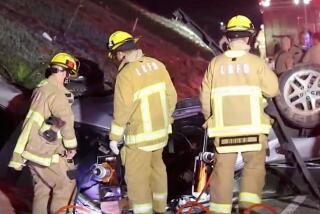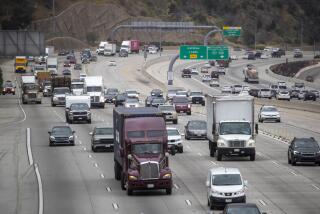Worker Struck, Killed by Car on Freeway : Risk: Freeway workers know any shift could be their last. Fear keeps their minds constantly on the traffic whizzing by them.
Between the workers who repair the roadways and the sometimes reckless motorists who drive by is very little protection from death or injury. Maybe a bright orange plastic cone. Or a long piece of screen on top of the concrete center divider. Or nothing at all.
With an endless stream of cars speeding close by, highway workers are vulnerable to danger no matter how many signs are posted or warning lights flash.
News that three of their own died in two separate accidents within 24 hours left many Caltrans maintenance workers and subcontractor employees shaken over concerns for their own safety Wednesday.
Workers said the fact that suspected drunk drivers were involved in the crashes on the Orange Freeway in Fullerton and the Long Beach Freeway in Paramount makes the news even more difficult to swallow because no amount of safety training can prepare them for a similar situation.
Fear of such accidents keeps their minds constantly on the traffic around them.
“Man, that could be me, it seems like to me,” Paul Mendoza, a 30-year-old laborer from Riverside County, said as he laid down a pipe in the center divider of the Costa Mesa Freeway.
“We’re taking our lives into our own hands once we get on this freeway,” he said. “Who knows if that guy had a drink at 2 or 3 a.m. Every night it goes through my mind, ‘You could be hit.’ My wife fears something could happen every night.”
Highway workers being injured on the job by passing motorists is common, said Caltrans spokesman Steve Saville.
But deaths are less common. In the past 20 years, there have been 89 deaths statewide--50 Caltrans maintenance workers and 39 subcontractor employees, according to agency statistics.
Since work began almost two years ago to widen the Santa Ana Freeway and Costa Mesa Freeway interchange, near-misses by motorists inattentive to the flares, beacon lights and flashing arrows have been all too frequent, workers said.
Joe Mendoza, 44, of Bloomington, the project’s general foreman and Paul Mendoza’s brother, recalls near-misses as if he were reading them from a list.
“How many times have I encountered this already?” he asked. “It’s a spooky feeling to wonder if it’s worth going out working on this job. . . . You don’t know who you’re going to encounter.
“When does this stop? The thing of it is, who’s going to be next? It’s like going out to the ocean and waiting for the shark to come up and get you. The public is in a hurry to get from point A to point B, and they don’t care what’s in between.”
For Paul Mendoza, one of 30 employees of a private firm contracted by Caltrans to add a freeway lane, there was the time he sat in the back of a truck to lift safety cones from the freeway, and a van sideswiped the truck, ripping off the bumper and side-view mirror.
Rick Stanley, Paul Mendoza’s partner at the time, said he keeps working despite the danger because of the $1,100-a-week pay.
Nonetheless, “I say goodby to my wife and kids every night before I go to work hoping I’ll make it back in the morning,” Stanley, 36, of Moreno Valley, said. “I hear it all the time from my wife. ‘Why don’t you quit? Why don’t you quit?’ The money’s good.”
In Orange County, Caltrans has 200 maintenance workers and a fluctuating number of subcontractors to do road repairs, Saville said. Caltrans also uses scores of violators sentenced to community service to pick up trash, he said.
Highway workers are sometimes the victims of a motorist’s bad temper, getting either verbal abuse or bottles hurled at them for traffic delays.
“Something that’s always in the back of their minds is you never want to have your back to traffic,” Saville said. “You may be down patching a road or trimming a hedge, but when you hear the screech of brakes you know which way to dive to avoid being hit.”
“All it takes is a slight slip by a motorist and you could lose your life,” he said.
On the Garden Grove Freeway near the Bristol Street exit, Wayne Bowers, 37, a member of Caltrans’ special repair crew, stopped to fix a guardrail. He was working without the benefits of a barricade or cones.
“It’s not too healthy out here,” he said as light traffic went by. “All of a sudden, if I don’t hear cars, I look up to see what’s going on.”
“You have to watch out for even the sober” drivers, said his partner Edward Martinez, 43. “We protect ourselves with safety glasses and barricades, but we can’t protect ourselves from other people.”
Added Bowers, snapping his fingers, “It could happen to anyone out here . . . like that.”
More to Read
Sign up for Essential California
The most important California stories and recommendations in your inbox every morning.
You may occasionally receive promotional content from the Los Angeles Times.










